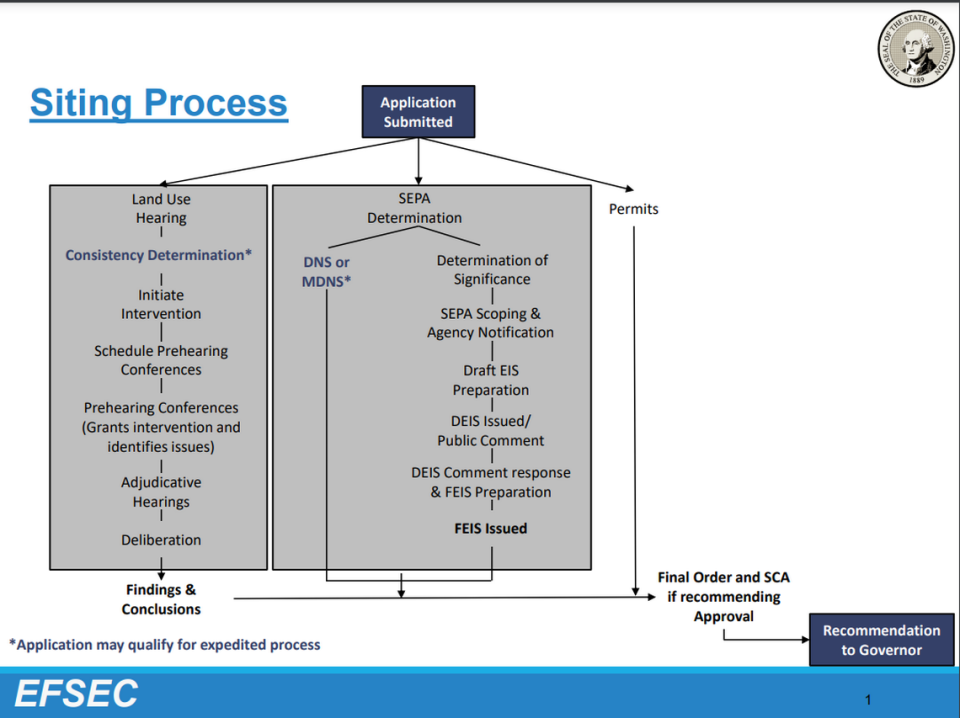WA state council in charge of Tri-Cities wind project responds to legislators’ concerns | Opinion
Editor’s Note: Last month, several Tri-City area legislators sent a letter to EFSEC regarding their concerns that state officials in charge of the Horse Heaven wind project are ignoring local interests. Here is the response from Kathleen Drew, chair of the Washington Energy Facility Site Evaluation Council (EFSEC).
Dear Members of the Legislature,
I am writing to acknowledge receipt of your June 9, 2023, letter where you voiced concerns regarding EFSEC’s environmental review under the State Environmental Policy Act (SEPA) and adjudication process, as it relates to the Horse Heaven Wind Project. I respect your commitment to serving Southeastern Washington constituents and appreciate the opportunity to clarify the EFSEC processes.
At EFSEC, we work to balance the increasing demands for energy facilities in conjunction with the broad interests of the public, with particular attention to overburdened communities, as we make siting recommendations to the governor. We conduct our work using thorough, science-based review methodologies and prioritize transparency, fairness, and objectivity in both our processes and recommendations.
The adjudicative proceedings are just one component of the EFSEC process by which the project proponents and opponents may present information to support their cases through formal hearings. The adjudicative proceedings run separately from the preparation of the Environmental Impact Statement (EIS), which is underway pursuant to SEPA law, RCW 43.21C.
EFSEC’s SEPA review and the adjudicative proceedings are relatable but separate processes, governed by their own distinct rules and procedures. The presence of the adjudicative proceedings does not accelerate nor compromise review and response to public input. Rather, the preparation of the Final EIS often runs concurrently and is distinct from the adjudicative proceedings.
For your reference, attached please find the EFSEC siting process flow chart.

Your letter expressed concerns regarding Washington Department of Fish and Wildlife’s (WDFW) ability to share scientific knowledge regarding endangered species. EFSEC maintains interagency agreements with WDFW who provides technical review and collaborates with EFSEC for the review of the project Application for Site Certification. Illustrative of our commitment to transparency, EFSEC posts agency comment letters including WDFW’s review letters on our website to ensure the public has access to this pool of scientific knowledge.
By law, all state agencies and local governments with members on the Council, as is the case with WDFW, are considered parties to any adjudicatory proceeding before the Council; however, they may not elect to participate as a party. The state Attorney General’s Office also appoints a Counsel for the Environment to be a party in the proceedings representing the public and its interest in protecting the quality of the environment. Additionally, all members of the public regardless of their employer may provide public input during public comment opportunities conducted by EFSEC. As a result, these different mechanisms for input offer the best available knowledge regarding species and habitat impacts, which we incorporate into our review of the project application.
Lastly, the decision to conduct the Horse Heaven Wind Project adjudicative proceedings in a virtual format was based primarily on the value of fairness and provides the most cost- effective means to maximize participation for Council members, parties, witnesses, and the citizens of Washington. In a virtual setting, all witnesses will be presented in the same fashion and no parties will be afforded the opportunity for additional interaction with Council members by virtue of appearing at an in-person hearing session, while others are only able to be present remotely in a hybrid proceeding.
Since shifting to a virtual format three years ago, EFSEC has effectively conducted business in a virtual format, minimizing barriers for access and enabling more public participation. A virtual hearing eliminates the need for long-distance travel and associated expenses, including lodging, meals, mileage, and child care. Through a virtual format, the public can view all virtual hearing sessions live or streamed from EFSEC’s website at their convenience.
As a regulatory agency, EFSEC strives to conduct business in a transparent, objective, and neutral manner, and I appreciate the opportunity to engage in this dialogue and highlight our shared values.
Sincerely,
Kathleen Drew, Chair of the Washington Energy Facility Site Evaluation Council.

